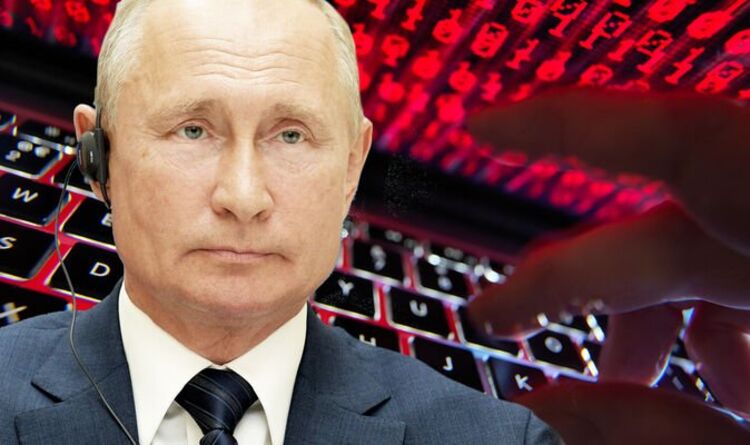Russian cyber-attack capabilities are unknown says expert
We use your sign-up to provide content in ways you’ve consented to and to improve our understanding of you. This may include adverts from us and 3rd parties based on our understanding. You can unsubscribe at any time. More info
UK, EU and US leaders have all warned Vladimir Putin’s government of sanctions should it invade Ukraine. These threats might buy those involved time to think about what to do with the more than 100,000 Russian troops massed along its neighbour’s borders. However, it is not all about military power. While the most obvious of dangers — tanks, artillery and missiles — has grabbed the world’s attention, Moscow could be preparing a subtler incursion: cyber attacks.
As tensions over Eastern Europe’s security grow, with presidents and prime ministers on constant trips to either Moscow or Kiev, the European Central Bank (ECB) has said it is preparing banks for a possible Russian-sponsored cyber attack.
The regulator, which has oversight of Europe’s biggest lenders, has issued an alert for the threat.
While the bank’s attention has primarily been on ordinary scams that grew during the pandemic, the crisis in Ukraine has shifted its focus.
Andrea Enria, chair of the regulator’s supervisory board, told a news conference on Thursday: “We are asking (banks) to strengthen their cyber regime measures and look at a potential increase in attacks and the danger of these attacks going forward.”
An unnamed ECB source told Reuters banks were conducting cyber war games to test their ability to defend themselves from an attack.

What is happening where you live? Find out by adding your postcode or visit InYourArea
The UK’s financial regulator has also told banks to bolster and test their defences against Russia-sponsored attacks, and the National Cyber Security Centre issued a statement with an equivalent warning.
Dr Scott Jasper, a Senior Lecturer at the National Security Affairs Department at the Naval Postgraduate School, told Express.co.uk: “Russia has the capability to conduct sophisticated cyber attacks on critical infrastructure in the West as a means of retaliation if their security demands are not resolved.”
Talks between Russia and the West all reach similar conclusions: The Kremlin wants guarantees NATO is not ready to offer.
The Alliance is keen to “listen to Russia’s concerns”, as stressed by its chief, Jens Stoltenberg, this week. However, it is now willing to give up “the fundamental principles of European security that we have all signed up to”.
These principles include preventing a dynamic “where the big powers can tell others what they can or cannot do”.

Mr Putin’s team, in search of a promise from NATO it will never admit Ukraine as a member, claims it feels threatened by the strengthening ties of Kiev with the West.
This feeling is rooted in the countries’ fractured relations following Moscow’s seizure and annexation of Crimea in 2014.
NATO, in a bid to safeguard Ukraine’s sovereignty, insists that, although it has no intention to admit Ukraine anytime soon, providing such guarantees is a no-go.
But these repetitive exchanges, which have been going ever since the row took strength in October last year after a brief build-up earlier in April, put into question whether it is time for a harsher response from those who have the power to stop Mr Putin’s intimidation.
Dr Jasper, author of Russian Cyber Operations: Coding the Boundaries of Conflict, says the strategy of the Biden Administration is “to deter a Russian invasion by the threat of economic and military costs”, and that he cannot see that approach getting any tougher.
DON’T MISS
Germany’s Nord Stream 2 ‘mistake’ savaged [INSIGHT]
Putin and Biden’s high stakes phone call [ANALYSIS]
Putin’s war threat to cause ‘millions of refugees’ to head to Europe [REPORT]
Russia cyber attacks 'happening all the time' says Martin
He claimed: “The Biden Administration is working on a bipartisan package of crippling sanctions ahead of any potential invasion, while sending US cargo airplanes with $200 million in lethal military aid to Kiev, to include ammunition and antitank guided missiles.
“The imposition of punishing sanction now on Russia loses their deterrent effect and leverage for diplomacy to deescalate the crisis.”
In January, several Ukrainian government websites were compromised by what Ukraine’s state security service SBU linked to hacker groups associated with Russian intelligence services.
The following message, posted in Ukrainian, Russian and Polish, appeared on the hacked websites: “Ukrainian! All your personal data has been uploaded onto the public internet.
“This is for your past, your present and your future.”
The SBU claimed in just nine months last year it “neutralised” 1,200 cyber attacks or incidents.
Dr Jasper said: “The recent dual cybersecurity incidents in Ukraine are consistent with the Russian doctrine for Information Confrontation.
“The defacement of more than 70 Ukrainian government websites with threatening messages created a psychological effect on society, while the emplacement of wiper malware in dozens of computers in government agencies created a technical effect.”
During the 2008 Russo-Georgian war, government websites were shut down by attacks from Moscow, and during the annexation of Crimea, the Kremlin was accused of attempting to destabilise communications and cause confusion through cyber attacks while troops worked on the seizure of the peninsula.
The potential of further cyber attacks now opens up two questions – firstly, whether Mr Putin’s team could replicate what it did with Georgia and Crimea; secondly, whether a cyber offensive could be used by the Kremlin as a weapon to get what it wants from the West.
Source: Read Full Article
